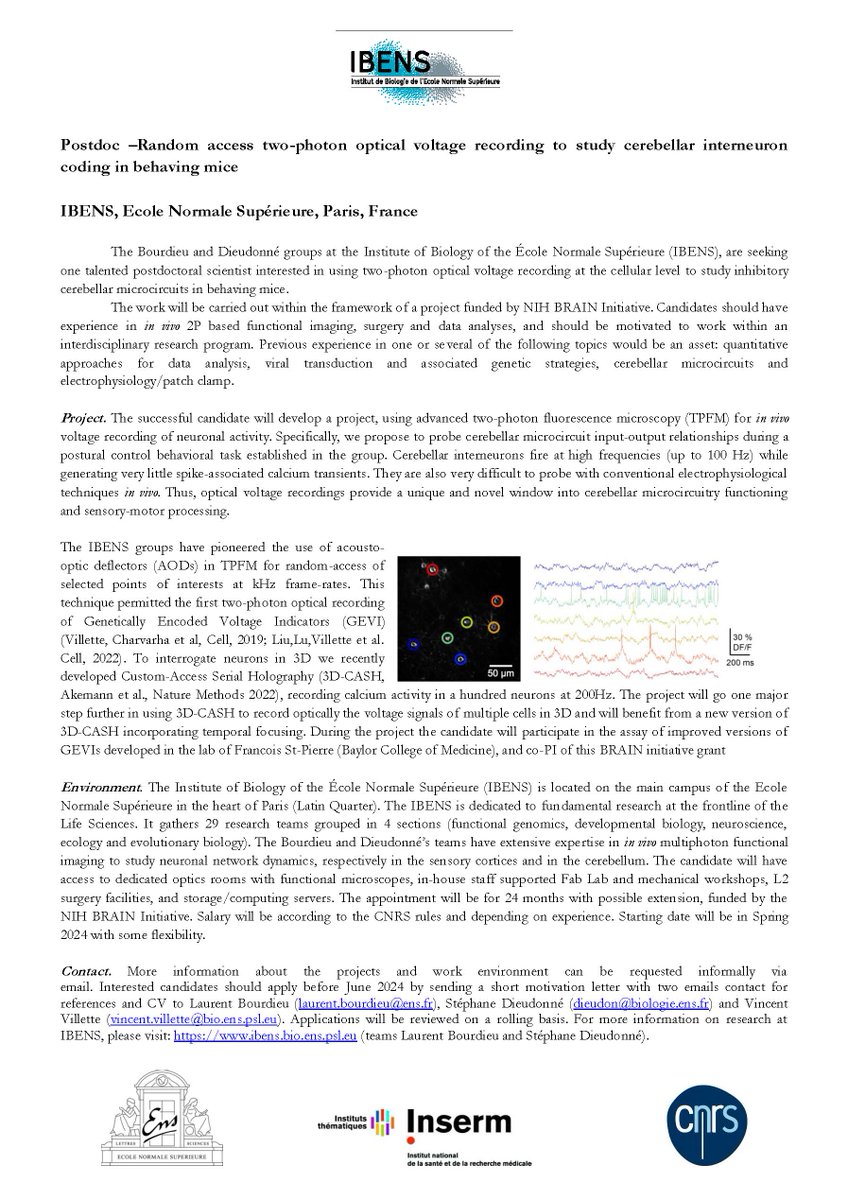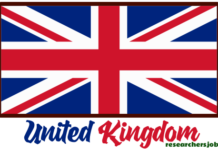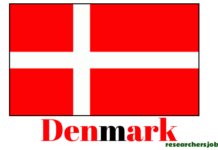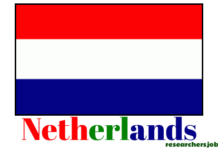Postdoc position–interneuron coding: The Bourdieu and Dieudonné groups at the Institute of Biology of the École Normale Supérieure (IBENS) are seeking a talented postdoctoral scientist for a unique project funded by NIH BRAIN Initiative. The position involves using two-photon optical voltage recording to study inhibitory cerebellar microcircuits in behaving mice.
Postdoc position–Random access two-photon optical voltage recording to study cerebellar interneuron coding in behaving mice
Designation: Postdoctoral Scientist
Research Area: In vivo 2P based functional imaging, surgery, and data analyses focusing on inhibitory cerebellar microcircuits in behaving mice.
Location: Institute of Biology, École Normale Supérieure, Paris (Latin Quarter), France
Eligibility/Qualification: Candidates should have a Ph.D. and experience in in vivo 2P based functional imaging, surgery, and data analyses. Motivation to work within an interdisciplinary research program is essential. Previous experience in quantitative approaches for data analysis, viral transduction, genetic strategies, and cerebellar microcircuits/electrophysiology/patch clamp would be an asset.
Job Description: The successful candidate will develop a project using advanced two-photon fluorescence microscopy (TPFM) for in vivo voltage recording of neuronal activity. The project aims to probe cerebellar microcircuit input-output relationships during a postural control behavioral task. Optical voltage recordings provide a unique window into cerebellar microcircuitry functioning and sensory-motor processing.
The project will utilize cutting-edge techniques, including acoustooptic deflectors (AODs) in TPFM for random-access, Custom-Access Serial Holography (3D-CASH) for 3D optical voltage recordings, and improved versions of Genetically Encoded Voltage Indicators (GEVIs). The candidate will collaborate with François St-Pierre (Baylor College of Medicine) on GEVI development.
How to Apply: Interested candidates should apply before June 2024 by sending a short motivation letter, two emails for references, and a CV to Laurent Bourdieu (laurent.bourdieu@ens.fr), Stéphane Dieudonné (dieudon@biologie.ens.fr), and Vincent Villette (vincent.villette@bio.ens.psl.eu). Applications will be reviewed on a rolling basis.
Table 1: Research Areas
| Research Area | Description |
|---|---|
| In vivo 2P based functional imaging | Study inhibitory cerebellar microcircuits in behaving mice using two-photon optical recording. |
| Surgery and data analyses | Utilize surgical techniques and data analyses for comprehensive research on cerebellar circuits. |
Table 2: Environment at IBENS
| Facility | Description |
|---|---|
| Dedicated optics rooms with functional scopes | Access to advanced microscopy equipment for research. |
| In-house staff-supported Fab Lab | Facilities for fabrication and prototyping. |
| L2 surgery facilities | Specialized facilities for surgical procedures. |
| Storage/computing servers | Access to storage and computing resources for data analysis. |
Table 3: Application Process Checklist
| Step | Details |
|---|---|
| Submit a short motivation letter | Express your interest in the project, highlighting relevant skills and experiences. |
| Provide two emails for references | Include contact information for references who can speak to your qualifications and capabilities. |
| Send a comprehensive CV | Detailing academic and research achievements, emphasizing relevant expertise. |
| Email application to specified contacts | Laurent Bourdieu (laurent.bourdieu@ens.fr), Stéphane Dieudonné (dieudon@biologie.ens.fr), and Vincent Villette (vincent.villette@bio.ens.psl.eu). |
| Applications reviewed on a rolling basis | Apply early to be considered promptly. |
For more information on research at IBENS, please visit: www.ibens.bio.ens.psl.eu (teams Laurent Bourdieu and Stéphane Dieudonné).









